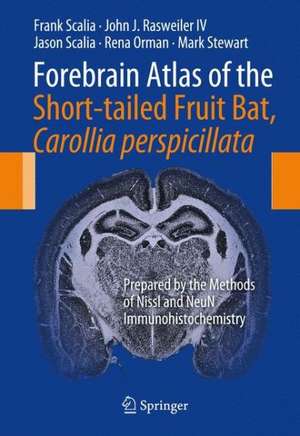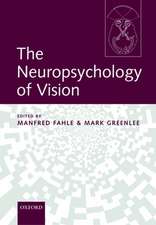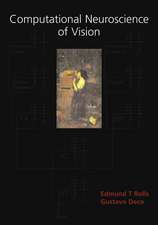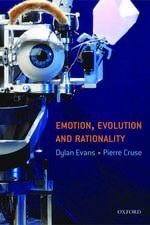Forebrain Atlas of the Short-tailed Fruit Bat, Carollia perspicillata: Prepared by the Methods of Nissl and NeuN Immunohistochemistry
Autor Frank Scalia, John J. Rasweiler IV, Jason Scalia, Rena Orman, Mark Stewarten Limba Engleză Spirală – 24 mai 2013
Carollia perpicillata, a tropical species, is the only bat that has essentially been domesticated and can be maintained and propagated in a research environment utilizing simple, inexpensive husbandry procedures. The NeuN preparations used in this atlas selectively stain neurons in a sharp black coloration that fills not only the cell body but extends a short distance along the proximal dendrites. Thus, as distinct from the traditional nissl stains, which generate a shade of blue largely restricted to the cell body, the NeuN generates a quasi Golgi-like image of the neurons. This provides a more intimate view of the neurons than can be obtained from nissl staining. In addition, the background is essentially white, facilitating high-contrast photography and allowing for gray-tone illustration without any loss of information. The NeuN procedure does not stain axons, and since it does not stain glial cells or their nuclei, the noise ordinarily generated in nissl stains by the presence of glial cells among the neurons and in the white matter is entirely eliminated.
The Forebrain Atlas of the Short-tailed Fruit Bat also includes nissl stained sections for two reasons: One, since some readers may be unfamiliar with the NeuN images, it is useful to include familiar images for comparison. More importantly, it is known that NeuN is not expressed in certain neurons, such as Purkinje cells, olfactory bulb mitral cells, and the cells of the paraventricular and supraoptic nuclei. The nissl stained sections are thus included to provide complementary views of such structures.
The atlas will be useful for students and investigators doing neuroscience research on bat and other mammalian species,as well as students of comparative biology, zoology, brain evolution, and the history of neuroanatomical analysis.
Preț: 632.70 lei
Preț vechi: 744.35 lei
-15% Nou
Puncte Express: 949
Preț estimativ în valută:
121.08€ • 124.92$ • 102.48£
121.08€ • 124.92$ • 102.48£
Carte disponibilă
Livrare economică 11-25 februarie
Preluare comenzi: 021 569.72.76
Specificații
ISBN-13: 9781461470878
ISBN-10: 1461470870
Pagini: 70
Ilustrații: XX, 44 p. 52 illus.
Dimensiuni: 178 x 254 x 12 mm
Greutate: 0.2 kg
Ediția:2013
Editura: Springer
Colecția Springer
Locul publicării:New York, NY, United States
ISBN-10: 1461470870
Pagini: 70
Ilustrații: XX, 44 p. 52 illus.
Dimensiuni: 178 x 254 x 12 mm
Greutate: 0.2 kg
Ediția:2013
Editura: Springer
Colecția Springer
Locul publicării:New York, NY, United States
Public țintă
ResearchCuprins
Introduction.- Notes on Nomenclature and Labeling.- List of Abbreviations.- Index of Labeled Structures.- Low-power Whole-Section Series (Bars = 1.0 mm).- Plates L1–L23.- Selected Higher-Resolution Frames.- Thalamus (Bars = 0.5 mm): Plates T1–T12.- Amygdaloid Region (Bars = 1.0 mm): Plates A1–A12.- Literature Cited.
Textul de pe ultima copertă
Carollia perspicillata, a tropical species, is the only bat that has essentially been domesticated and can be maintained and propagated in a research environment utilizing simple, inexpensive husbandry procedures. This atlas contains the first quality treatment of a bat species, and is unique in its use of NeuN staining. The NeuN preparations used selectively stain neurons in a sharp black coloration that fills not only the cell body but extends a short distance along the proximal dendrites. Thus, as distinct from the traditional nissl stains, the NeuN generates a quasi Golgi-like image of the neurons, providing a more intimate view of the neurons than can be obtained from nissl staining. In addition, the background is essentially white, facilitating high-contrast photography and allowing for gray-tone illustration without any loss of information. The NeuN procedure does not stain axons, and since it does not stain glial cells or their nuclei, the noise ordinarily generated in nissl stains by the presence of glial cells among the neurons and in the white matter is entirely eliminated.
The Forebrain Atlas of the Short-tailed Fruit Bat also includes nissl stained sections for comparison. Since it is known that NeuN is not expressed in certain neurons, such as Purkinje cells, olfactory bulb mitral cells, and the cells of the paraventricular and supraoptic nuclei, the nissl stained sections are also included to provide complementary views of such structures.
The Forebrain Atlas of the Short-tailed Fruit Bat also includes nissl stained sections for comparison. Since it is known that NeuN is not expressed in certain neurons, such as Purkinje cells, olfactory bulb mitral cells, and the cells of the paraventricular and supraoptic nuclei, the nissl stained sections are also included to provide complementary views of such structures.
Caracteristici
The first high quality brain atlas of any bat species ? Illustrated with high power photomicrographs for a further documentation of the unique value of the NeuN immunostaining Useful for students and investigators doing neuroscience research on bat and other mammalian species, as well as students of comparative biology, zoology, brain evolution, and the history of neuroanatomical analysis













